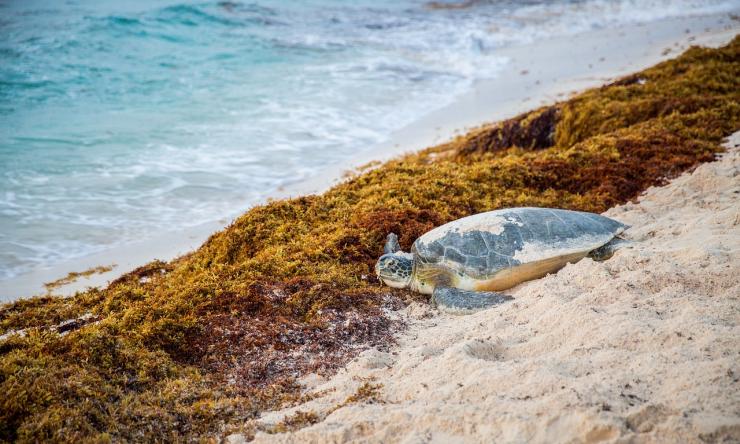Sargassum seaweed carries potential for respiratory problems
A 5,000-mile floating mass of seaweed has already started washing up on Florida beaches, and with it, the potential for respiratory health concerns. A Baylor College of Medicine expert explains what you need to know to keep your family safe at the beach.
“The sargassum itself is not dangerous. It can have different jellyfish and sea creatures in it that could be a source of sting,” said Dr. Sarah Shafer, medical toxicologist and assistant professor in the Henry J.N. Taub Department of Emergency Medicine at Baylor. “Once the sargassum washes up on the beach, in 48 hours it will start to break down and lose toxic gasses. As it decomposes, we have to worry about potential exposure to humans.”
Sargassums decompose in multiple ways, including releasing ammonia and hydrogen sulfide, a toxic gas. When hydrogen sulfide is “off gassed,” it can produce the smell of rotten eggs even at low levels, Shafer said. When the gas reaches a certain level, however, humans can become “nose-blind” and not smell it.
“At low levels, it smells like rotten eggs in the air. This happens in natural hot springs, like at Yellowstone. It can cause some irritant effects,” she said. “In high levels, it can cause sudden death.”
When highly concentrated in a closed-off area like a sewer, hydrogen sulfide can be deadly. The compound is a chemical asphyxiant, which means it can interfere with how cells function, Shafer explained.
Since beach seaweed is not in a closed-off area, asphyxiation will not be a concern for any gas emitted. But it will be important to pay attention to different smells when around seaweed this summer.
What to look out for:
- Rotten eggs or ammonia smell
- Irritated eyes
- Nausea
- Soft tissue irritation if you touch a piece of seaweed with a higher concentration of hydrogen sulfide
People most at-risk:
- Those diagnosed with asthma or other respiratory conditions
- Those who live near the beach
Shafer recommends anyone with respiratory concerns leave the area if they smell rotten eggs. “If you don’t feel good, get away from it,” she said. “If there is enough sargassum that’s off-gassing that much, you won’t want to be there anyway.”










